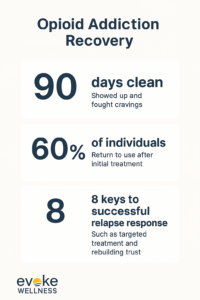You Didn’t Try and Fail—You Learned What Didn’t Work
You got 90 days clean and that didn’t happen by accident. You showed up. You fought cravings. You saw what life could be without opioids. Then something shifted. Maybe it was stress. Maybe loneliness. Or something you’ve yet to name. And one day, you used again. It’s painful. But here’s the truth: your stumble doesn’t erase the progress. Let’s talk about why, and what you can do now.
1. Relapse Isn’t Failure—It’s Crucial Information
At Evoke Wellness at Cohasset in Cohasset, we believe every return to use is not a failure—it’s a signal that something in your care didn’t hold. Maybe your support network isn’t strong enough yet. Maybe old trauma still lives inside. Maybe your coping skills need a remodel.
Instead of shame, we treat relapse as valuable intelligence. What were you feeling that day? Who triggered you? What craving was deeper than your plan? When you know that, you can rebuild a recovery that actually makes sense for you.
2. Opioid Addiction Treatment Is Meant for Comebacks, Not Just First Timers
You don’t have to feel broken to go back to treatment. Long-term recovery isn’t one-and-done—it’s a lifetime commitment. For some, the first time is just step one.
Our prescription drug rehab program isn’t judgmental. It’s compassionate. We welcome you back with open arms—even if it’s your 2nd, 3rd, or 10th time. Because real healing isn’t about perfection. It’s about perseverance.
3. This Time, Treatment Can Be Smarter and More Targeted
Your previous experience gives you insider knowledge. You know what worked—group therapy, meditation, accountability calls—and what didn’t—maybe you skipped family sessions or resisted medication.
Now? You can craft your path more intentionally: try outpatient aftercare earlier. Ask for medication-assisted treatment if cravings became unbearable. Lean into trauma-informed therapy if you noticed old wounds resurfacing. This time, your treatment team is building with you, not for you.
4. Rebuilding Trust From the Inside Out
That voice in your head is loud: “You relapsed—who can trust you?” Trust isn’t erased overnight—but it is rebuildable. And it starts even now.
Tiny steps matter: a daily wake-up without checking in with your sponsor. A text to a friend when you feel like using. A meditation before bed. Every day you take a step toward consistency, you place a brick in the trust you’ve lost.
We help you set rituals that reinforce who you are becoming—not who you used to be.
5. Stepping Back Into Treatment Is An Act of Strength, Not Defeat
It’s tempting to think: “If I call them again, I’ve lost.” But the opposite is true: you’ve chosen your life over something that threatened it. You’ve said, “This matters.” And that takes courage. Admitting you need help again isn’t weakness—it’s the hardest kind of bravery.
We’ve seen alumni who graduated, relapsed, and came back stronger. Because they refused to let a stumble define their story.
6. You’re Not Starting Over—You’re Continuing the Journey
You’ve walked this path before. You’ve peeked inside a sober world. You’ve tasted clarity. That’s not ruined—it’s a foundation you can use again.
Your next chapter will be built on veteran territory. You’ll remember group norms. You’ll recognize trigger signs early. You’ll know the power of being vulnerable first, when your walls are still half off. That awareness strengthens your recovery—if you use it wisely.
7. You Deserve a Recovery That Grows with You
Recovery isn’t one-size-fits-all. If your first try didn’t work because you resisted family therapy, or refused MAT, or didn’t address emotions, now you get another shot—with insight. And with a team that meets you where you are.
Our opioid addiction treatment services are tailored to fit YOU: whether that’s resuming medication like buprenorphine or naltrexone, joining alumni-specific group support, or digging deeper into what fuels the cravings you didn’t address before.
8. Recovery is a Marathon—with Hills and Valleys
You already showed you can go far. But we all hit walls. Plateaus. Downhills. The important thing isn’t never stumbling—it’s continuing the run. This isn’t a sprint. It’s stamina, strategy, and a pace that fits your life.
Slipping doesn’t disqualify you from finishing—it shows you’re human. And it gives you a chance to strengthen your legs before the next mile.
A Metaphor to Carry With You
Picture your recovery like a mountain trail. The first time, you climbed with fresh legs and open skies. You made it halfway, then a storm hit, you slipped, and fell. That fall hurt. It shook you. But you didn’t give up.
Now, you’ve seen part of the path. You know where it narrows. Now, you can climb with a better route, a sturdier backpack, and a team that knows the terrain. The climb gets harder. The view gets better.
You’re Still Walking Your Journey—Keep Going
You survived 90 days. That proves you can do hard things. Now it’s time to take the next step. Maybe it’s calling back. Maybe it’s sharing in a meeting. Maybe it’s forgiving yourself for falling.
We’re here to walk with you, through each crescent step forward. If opioid addiction treatment didn’t stick the first time, that’s not your fault. It’s just part of the healing story you’re writing—and the story isn’t over. Not by a long shot.
Ready to step forward again? Call 866‑931‑6429 or to learn how our opioid addiction treatment services in Cohasset, MA can support your comeback—no judgment, just hope.
Frequently Asked Questions (FAQs)
Q: Do I have to complete the full program again?
A: No. We don’t force cookie-cutter timelines. Instead, we’ll meet you where you are. Already went through detox? Great. You might need outpatient therapy and peer support. Want to try medication you skipped before? We’ll support that. It’s about fit, not formula.
Q: Will a relapse tarnish my chances of success?
A: Absolutely not. In fact, relapse often deepens recovery. It sharpens awareness. It humbles us. It reminds us why we started. What happens next matters more than what came before.
Q: I’m worried about what family will say if I go back to treatment.
A: That’s understandable. You’re not letting them down—you’re choosing you. And your willingness to try again shows maturity, integrity, and bravery. Consider sharing a short message with them beforehand, something like: “I care so much about staying well—and I’m taking another step to protect that.”
Q: Will I need medication this time?
A: Medication-assisted treatment (MAT) like buprenorphine or naltrexone can offer reliable support—especially after a relapse. It’s not mandatory, but it’s a tool you haven’t fully tried yet. It’s not about being weak—it’s about being strategic.
Q: What if I relapse again?
A: We continue with the same principle: relapse is information, not stigma. We sus out what happened, retool your support, and keep you moving. Even if there’s another slip, we believe in you. Because it’s not the relapse that defines you—it’s your stubborn will to keep healing.





